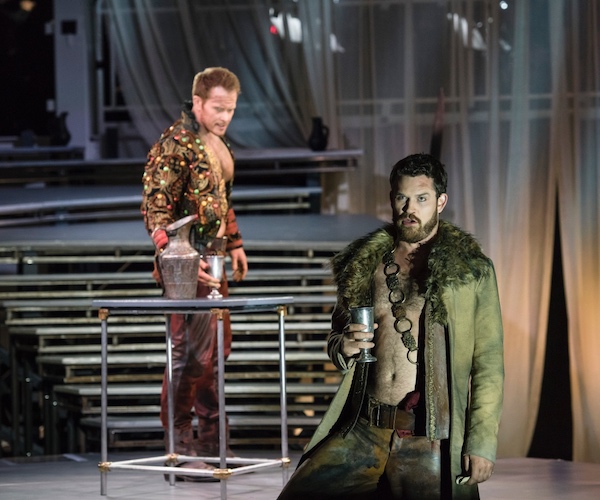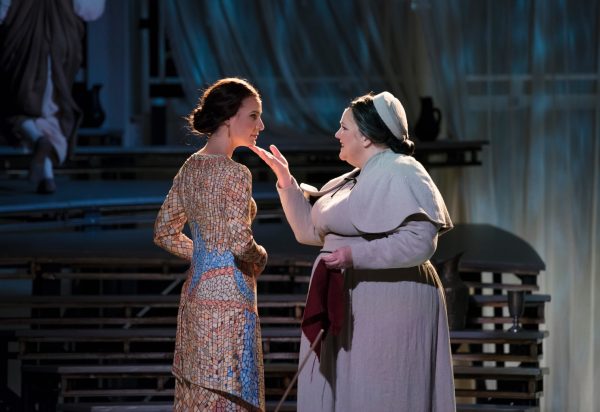Opera Review: Boston Lyric Opera’s “The Rape of Lucretia” — Bravi Tutti
By Susan Miron
The Boston Lyric Opera is mounting a fabulous staging of Benjamin Britten’s visceral opera.
The Rape of Lucretia, Music by Benjamin Britten, Libretto by Ronald Duncan, After the play by André Obey. Boston Lyric Opera production at the Artists for Humanity EpiCenter, 100 West 2nd Street, Fort Point, Boston, MA, through March 17.

Duncan Rock as Tarquinius (rear) and Brandon Cedel as Collatinus in Boston Lyric Opera’s production of “The Rape of Lucretia.” Photo: Liza Voll.
Boston Lyric Opera’s production of Benjamin Britten’s opera The Rape of Lucretia cannot be recommended highly enough. The singers are uniformly superb; the chamber orchestra is in top form, especially the harpist Ina Zdorovetchi, who successfully meets the challenge of setting up a number of varying moods. Everyone associated with this production staged at Artists for Humanity Epicenter should be given kudos, from conductor (David Angus) and stage director (Sarna Lapine) to costume designer (Robert Perdziola).
The Rape of Lucretia was first performed in July 1946 at Glyndebourne, a mere thirteen months after the successful premiere of Britten’s opera Peter Grimes, which critics consider to be the beginning of a renaissance in English opera. They are a fascinating study in contrasts. Grimes is a grand work, with chorus and full orchestra, firmly rooted in the 19th-century tradition. But its successor was economy itself, requiring just eight singers and 13 musicians — part of a 20th-century fascination with tapping the emotional and intellectual directness of stripped-down music theater. Interestingly, because many products in the UK were still rationed in 1946, the costumes for the production of The Rape of Lucretia were paid for with hundreds of clothing coupons.
A chorus made of The Male (Jesse Darden in a tie and jacket) and Female (Antonia Tamerin a glamorous dress) give us the historical background to the tragedy of Lucretia, although their synopsis is anachronistic. Their views on this pagan drama — the end of the reign of the Etruscan King Tarquinius Superbus (the threateningly sultry Duncan Rock) in 510 BC — reflect those of a later, Christian era. This debauched new monarch is leading Rome’s forces against a Greek invasion. Outside the city at a military camp, his son, prince Tarquinius Sextus (Duncan Rock) , is drinking with two generals, Collatinus (Brandon Cedel) and (David McFerrin). The night before, a group of generals had returned home to Rome; they discovered, to their shock, that all of their wives had been unfaithful, except for Lucretia, the loyal wife of Collatinus. An embittered Junius tempts Tarquinius into testing Lucretia’s chasteness and virtue. Tarquinius takes up the challenge. The three married men are clad in tight brown pants, their shirt tops provocatively open, their buff chests on display. the guys look ultra-macho and, in these #MeToo times, downright threatening. Ironically, the performers sang and acted with sinister magic.

Kelley O’Connor as Lucretia and Margaret Lattimore as Bianca in Boston Lyric Opera’s production of “The Rape of Lucretia” Photo: Liza Voll.
Tarquinius calls for his horse and heads for Lucretia’s in Rome. Arriving late evening, he finds Lucretia with Bianca (Margaret Lattimore) and Lucia (Sara Womble), her devoted servants. Hospitality forces Lucretia to offer this man — of very questionable intentions — a room for the night. During the evening, he enters her room, wakes her, and rapes her. Lucretia pleads she is in love with her husband, but Tarquinius insists she yearns for him. And there are clues that she has thought, often, of the man. When, the next day, she tells her husband about the rape, Lucretia is interrupted by the sounds of a Viennese waltz and a polka, fragments of what Tarquinius had sung to her before the rape.
At the time of Lucretia’s premiere, operas in England were required to be passed for public performance by the Lord Chamberlain’s Office. The Office commented that a particular phrase (which refers to Tarquinius’s ‘unsheathed sword’) be removed because it was ‘little better than the obscenities in D.H. Lawrence’s Lady Chatterley’s Lover.’ In these times, the unsheathed sword of the rapist is as threatening as ever, and when we see it, we know trouble lies ahead. As in Peter Grimes, the victim of violence feels that the only solution to degradation is suicide. Her death leaves those close to Lucretia devastated and, in the Passacaglia which forms Lucretia’s funeral march, they sing, “It is all! It is all!” Her demise provides the impetus for the Romans to throw out the tyrannical Tarquinius.
BLO’s Lucretia is the wonderful Kelley O’Connor, and she handles the role perfectly, singing and acting magnificently.
The horrific tale of Lucretia provided Britten with the emotional incentive to write some of his most beautiful, distressing, heart-stopping music. (If you can’t make it to these performances, there is a fine recording of Lucretia on You Tube featuring Lorraine Hunt Lieberson,) Of course, you have a few more days to take in the BLO’s excellent production of this dark, beguiling opera. Bravi tutti.
Susan Miron, a harpist, has been a book reviewer for over 30 years for a large variety of literary publications and newspapers. Her fields of expertise were East and Central European, Irish, and Israeli literature. Susan covers classical music for The Arts Fuse and The Boston Musical Intelligencer.
Tagged: Benjamin Britten, Boston-Lyric-Opera, Susan Miron

I think you and I were at different places. I was there the 15th and thought the venue was horrible, the female singers weak and Britten’s “music” almost unbearable. I wasted $350.00 and 8 hours of my time. BLO hit an all time low with this one. Maybe they should stick to the standards.